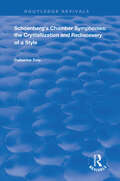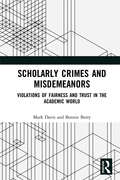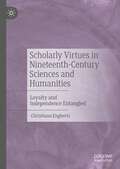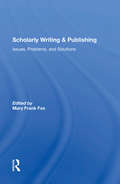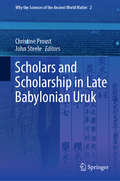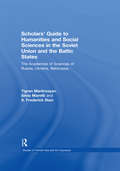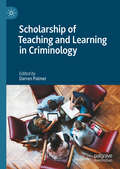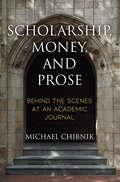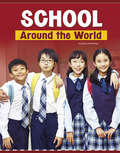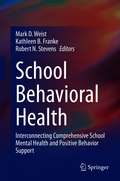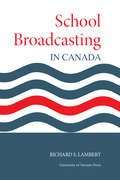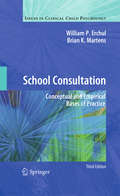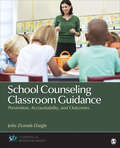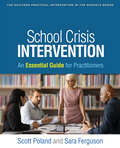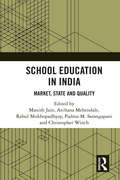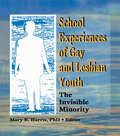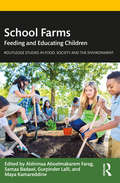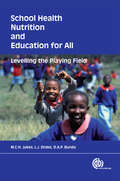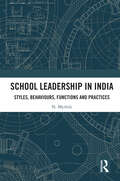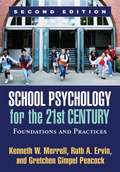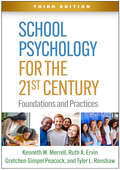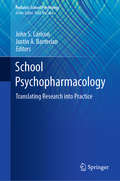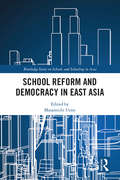- Table View
- List View
Schoenberg's Chamber Symphonies: The Crystallization and Rediscovery of a Style
by Catherine DaleThis title was first published in 2000: In this detailed study, Dale (music, U. of Hull) identifies the two chamber symphonies (Opus 9 and Opus 38) that she considers to be pivotal moments in Schoenberg's musical development, and how Opus 38 seeks a reconciliation of tonality and atonality. In addition to analyzing the works, she examines those which preceded Opus 9 and indicate the composer's progression towards atonality. In a similar exploration of pieces surrounding Opus 38, she provides an assessment of the triadic language that became available to the composer in his late tonal and serial works. She also makes reference to Schoenberg's musical sketches, several of which are reproduced in this volume along with other examples from scores.
Scholarly Crimes and Misdemeanors: Violations of Fairness and Trust in the Academic World
by Mark S. Davis Bonnie BerryThis book explores the problem of scientific dishonesty and misconduct – a problem that affects all disciplines, yet whose extent remains largely unknown and for which established standards for reporting, prevention, and punishment are absent. Presenting examples of research misconduct, the authors examine the reasons for its occurrence and address the experience of victimization that is involved, together with the perpetrators’ reactions to being accused. With consideration of the role of witnesses and bystanders, such as book and journal editors and reviewers, students and professional organizations, the book covers the many forms of academic misconduct, offering a theorization of the phenomenon in criminological terms as a particular form of crime, before examining the possibilities that exist for the prevention and control of scholarly crime, as well as implications for further research. An accessible treatment of a problem that remains largely hidden, Scholarly Crimes and Misdemeanors will appeal to readers across disciplines, and particularly those in the social sciences with interests in academic life, research ethics and criminology.
Scholarly Virtues in Nineteenth-Century Sciences and Humanities: Loyalty and Independence Entangled
by Christiaan EngbertsReflecting a growing interest in the history of knowledge, this book explores the importance of scholarly virtues during the late nineteenth century. The practice of science is moulded on notions of scholarly values, such as diligence, impartiality, meticulousness and patience, but here, the author focuses on the virtues of collegial loyalty and critical independence. By analysing how virtues were reflected in day-to-day scholarly work, and examining the possibility that these virtues may have come into conflict with each other, this book sheds light on what is often described as ‘the moral economy of scholarship,’ a metaphor which draws attention to the changeability of the expectations raised by virtue. Highlighting the pre-eminence and exemplary nature of German scholarship during the nineteenth century, the author provides a detailed analysis of four evaluative practices used by scholars across the humanities, social sciences and natural sciences in a number of German universities.This allows a nuanced understanding of the complex relationship between collegial loyalty and critical independence in the academic working environment, and draws comparisons across varying disciplines. A welcome contribution to a growing field of research, this book provides a comparative and transdisciplinary overview of scholarly virtues and will be of interest to those researching the history of science and the humanities.
Scholarly Writing And Publishing: Issues, Problems, And Solutions
by Mary Frank FoxThis book is a major project of the Research and Publications Committee of Sociologists for Women in Society (SWS). SWS has supported the project from its very start with organizational resources and the intellectual contributions of its members. For her early support of the project, we especially thank Roberta Cohen, SWS president, 1982-1984. All royalties from this book will return to SWS. With a belief in the importance of scholarly publishing, the contributors' skill and responsiveness, and the support of SWS and of Westview's staff (especially Deborah Lynes, Jeanne Campbell, Christine Arden, and Sandi Genova), I have found it a pleasure to produce this collection.
Scholars and Scholarship in Late Babylonian Uruk (Why the Sciences of the Ancient World Matter #2)
by Christine Proust John SteeleThis volume explores how scholars wrote, preserved, circulated, and read knowledge in ancient Mesopotamia. It offers an exercise in micro-history that provides a case study for attempting to understand the relationship between scholars and scholarship during this time of great innovation. The papers in this collection focus on tablets written in the city of Uruk in southern Babylonia. These archives come from two different scholarly contexts. One is a private residence inhabited during successive phases by two families of priests who were experts in ritual and medicine. The other is the most important temple in Uruk during the late Achemenid and Hellenistic periods. The contributors undertake detailed studies of this material to explore the scholarly practices of individuals, the connection between different scholarly genres, and the exchange of knowledge between scholars in the city and scholars in other parts of Babylonia and the Greek world. In addition, this collection examines the archives in which the texts were found and the scribes who owned or wrote them. It also considers the interconnections between different genres of knowledge and the range of activities of individual scribes. In doing so, it answers questions of interest not only for the study of Babylonian scholarship but also for the study of ancient Mesopotamian textual culture more generally, and for the study of traditions of written knowledge in the ancient world.
Scholars' Guide to Humanities and Social Sciences in the Soviet Union and the Baltic States: The Academies of Sciences of Russia, Ukraine, Belorussia, Moldova, the Transcaucasian and Central Asian Republics and Estonia, Latvia and Lithuania (Studies of Central Asia and the Caucasus)
by S. Frederick Starr Tigran Martirosyan Silvia MarettiIn the years since the first edition of the "Guide" was published, the research institutions of the academies of sciences of the USSR and the republics have undergone several, sometimes radical, reorganizations and reaffiliations. This guide to academy institutions supplies names, addresses, and historical, research, and organizational profiles for each institution, with summary information on staffing, current projects, special facilities, and libraries. The end of the Cold War has brought with it many changes of attitude and policy in the political arena; however, nowhere has change been so emotionally charged as in the area of politically-based emigration. Refugee policy is the driving force behind many of today's headlines, influencing both foreign and domestic policy. In Desperate Crossings, authors Norman L. and Naomi Flink Zucker chronicle and analyze the phenomenon of mass escape that began with the Haitians, but exploded into the American consciousness in the spring of 1980 with the Mariel boatlift and the subsequent mass exodus from Central America, and was most recently manifested in the Haitian and Cuban exoduses of 1994. In a compelling and carefully documented narrative, they identify the troika of interests - foreign policy, domestic pressures, and costs - that have controlled and determined the American response to refugees since before the Second World War, continuing until today. Desperate Crossings concludes by proposing a comprehensive and politically palatable approach to future refugee flows, both in our hemisphere and for the world community-at-large - including Europe and Asia. The authors suggest how, by changing the course of its refugee policies and programs, the United States can better respond to both the needs of refugees and the demands of its citizens.
Scholarship of Teaching and Learning in Criminology
by Darren PalmerThis book is the first dedicated collection aimed at examining teaching and learning issues within criminology. This collection of essays identifies how criminological practices are being shaped by larger developments and changes within the field of scholarship on teaching and learning. Changes include an increased university focus on ‘good teaching’ rankings and the associated emphasis on the professional development of teaching staff in order to shape them. In the past decade government funding for teaching and learning awards, and the move to sector funding on the basis of ‘good teaching’ outcomes (student satisfaction, completion rates, etc.), have further fostered developments in teaching and learning practices and the associated scholarship. However, criminology lags behind in responding to these changes. Scholarship of Teaching and Learning in Criminology aims to fill this gap by examining teaching practices in the hope of fostering a new generation of publications dedicated to scholarship on teaching and learning within the field.
Scholarship, Money, and Prose: Behind the Scenes at an Academic Journal
by Michael ChibnikAn illuminating guide to publishing a scholarly journal written by a former editor-in-chiefAmerican Anthropologist is the flagship journal of the American Anthropological Association, published quarterly, reaching more than 12,000 readers with each issue and representing four distinct subfields. The journal publishes articles that add to, integrate, synthesize, and interpret anthropological knowledge; commentaries and essays on issues of importance to the discipline; and reviews of books, films, sound recordings, and exhibits. From 2012 to 2016, Michael Chibnik was editor-in-chief of American Anthropologist. In Scholarship, Money, and Prose, he writes a candid account of the complex and challenging work entailed in its production.Providing detailed ethnographic and historical descriptions of the operations of a major journal and behind-the-scenes anecdotes of his experiences, Chibnik makes transparent the work of an editor-in-chief. He reveals how he assembled diverse materials, assessed contradictory peer reviews of manuscripts submitted for publication, and collaborated with authors to improve the legibility and clarity of their articles. He also examines controversies that emerged from his columns on open access and biological anthropology and the inclusion of politically charged material in the journal.Scholarship, Money, and Prose sheds light on two aspects of successful editing that are common to academic journals whatever their subject matter. The first task is to strike a balance among different theoretical perspectives and topical specialties. This pressure is particularly salient in a field like anthropology in which scholars differ greatly in the extent to which they adopt a scientific or humanistic perspective. Second, editors must attend carefully to the need to keep costs down and revenues up in an economic environment in which libraries are cutting subscriptions and publishers are considering the future sustainability of journals. Relevant to a wide range of disciplines, Scholarship, Money, and Prose serves as a window onto the past, present, and future of scholarly publishing.
School Around the World (Customs Around the World)
by Mary MeinkingLearning is important no matter where you are. But some classrooms are very different than others. Discover all types of schools around the world in this fun, engaging series that develops kids' understanding of our diverse global community and their place in it.
School Behavioral Health: Interconnecting Comprehensive School Mental Health and Positive Behavior Support
by Mark D. Weist Kathleen B. Franke Robert N. StevensThis book examines the prevalence of emotional and behavioral problems in youth and the implications of little or low-quality mental health services available for them. It describes aspects of Positive Behavioral Interventions and Supports (PBIS) and school mental health (SMH) that work together to form a comprehensive service delivery model called the Interconnected Systems Framework (ISF). The term school behavioral health (SBH) is used to describe SMH and PBIS working together, as in the ISF. The book examines perspectives of key stakeholders through a series of research forums, during which participants identified critical themes for the advancement of SBH in South Carolina and the southeast region of the United States. Chapters address key themes of school behavioral health from these forums, such as collaboration, schoolwide approaches, quality of services, and support for specific populations, including military families and youth involved in the juvenile justice and child welfare systems. The book addresses barriers to providing behavioral health services at school as well as recommendations from key stakeholders for advancing SBH along these critical dimensions. This volume is a must-have resource for researchers, professors, and graduate students as well as practitioners, clinicians, and therapists across such interrelated disciplines as clinical child and school psychology, educational policy and politics, social work, public health, school counseling, family studies, juvenile justice, child and adolescent psychiatry, and child welfare and well-being services.
School Broadcasting in Canada
by Richard LambertThis book describes the origin, growth, and achievements of school broadcasting in Canada. Sections are devoted to the start of school broadcasting in each province, the establishment of national school broadcasts, and the work of the National Advisory Council on School Broadcasting. In the story, the part played by the Canadian Broadcasting Corporation in initiating and promoting the work of teaching by radio and in providing the facilities upon which it is based, is a significant one. The book is the first authoritative description, by the man largely responsible for its success, of an important and fruitful experiment in federal-provincial co-operation in the thorny field of education. To this co-operation is due the high standard of the school broadcasts which have earned for Canada world-wide recognition and appreciation. The book also describes the international aspects of this cooperation, particularly between Canada and Australia, Great Britain, and the United States.
School Consultation
by Brian K. Martens William P. ErchulSince its emergence during the 1960s, school consultation has become an important vehicle for delivering psychological and educational services. Cooperative efforts between skilled consultants and teachers, rooted in the principles of problem solving, social influence, and professional development, enhance student learning and adjustment while encouraging consultees to be more effective and proactive in their practice. The Third Edition of School Consultation: Conceptual and Empirical Bases of Practice shows in expert detail how this relationship works by synthesizing mental health and behavioral models of consultation with the most effective evidence-based practices (e.g., implementation support, response to intervention) informing the field today. The authors provide real-world contexts for all participants in the equation--consultants, teachers, students, staff, and the school itself--and thoroughly review consultation processes and outcomes for a contemporary practice-oriented approach suited to the new consultant, trainee, or researcher. Key features of the Third Edition include: An integrated mental health/behavioral model for school consultation.An organizational study of the school as a setting for consultation.Assessment issues and strategies particularly relevant to school consultation.Approaches to providing teachers with implementation support. Conceptual models for selecting academic and behavioral interventions.Administrative perspectives on school consultation.A real, transcribed case study analyzed by the authors.In the tradition of its predecessors, School Consultation, Third Edition, is a confidence-building tool for practitioners in school psychology, clinical child psychology, educational specialties, school counseling, special education, and school social work as well as a trusted reference for researchers in these fields.
School Counseling Classroom Guidance: Prevention, Accountability, and Outcomes (Counseling and Professional Identity)
by Jolie Ziomek-Daigle"Finally, a text that thoroughly covers the topic of classroom guidance – an effective tool for every school counselor at every school level." –Tiffany Bates, Louisiana Tech University Intended for school counselors to aid in the learning of developmental classroom guidance, School Counseling Classroom Guidance: Prevention, Accountability, and Outcomes teaches the fundamentals, strategies, and research outcomes of classroom guidance programming for comprehensive, developmentally appropriate school counseling programs. The content of this book looks at the history and fundamentals of classroom guidance, how these activities meet CACREP and ASCA standards, how and why activities should be aligned to the larger academic curriculum and state/national teaching standards, recommendations on how to develop and assess classroom guidance units, a sampling of units and lessons, techniques in managing the classroom, and outcome research and trends. School Counseling Classroom Guidance: Prevention, Accountability, and Outcomes is part of the Counseling and Professional Identity Series, which targets specific competencies identified by CACREP (Council for Accreditation of Counseling and Related Programs).
School Counseling Classroom Guidance: Prevention, Accountability, and Outcomes (Counseling and Professional Identity)
by Jolie Ziomek-Daigle"Finally, a text that thoroughly covers the topic of classroom guidance – an effective tool for every school counselor at every school level." –Tiffany Bates, Louisiana Tech University Intended for school counselors to aid in the learning of developmental classroom guidance, School Counseling Classroom Guidance: Prevention, Accountability, and Outcomes teaches the fundamentals, strategies, and research outcomes of classroom guidance programming for comprehensive, developmentally appropriate school counseling programs. The content of this book looks at the history and fundamentals of classroom guidance, how these activities meet CACREP and ASCA standards, how and why activities should be aligned to the larger academic curriculum and state/national teaching standards, recommendations on how to develop and assess classroom guidance units, a sampling of units and lessons, techniques in managing the classroom, and outcome research and trends. School Counseling Classroom Guidance: Prevention, Accountability, and Outcomes is part of the Counseling and Professional Identity Series, which targets specific competencies identified by CACREP (Council for Accreditation of Counseling and Related Programs).
School Crisis Intervention: An Essential Guide for Practitioners (The Guilford Practical Intervention in the Schools Series)
by Sara Ferguson Scott PolandProviding vital tools to enhance preparedness in any school setting (K–12), this book is grounded in state-of-the-art research and real-world experience. Foremost authority Scott Poland and frontline clinician Sara Ferguson address all aspects of team-based crisis intervention and postvention. With a key focus on prevention, the book describes ways to identify risk factors and enhance students' mental health, connectedness, and resilience. Best practices are outlined for responding effectively to specific crises, including unexpected deaths in the school community, youth suicide, school violence, and natural disasters. In a convenient large-size format, the book includes firsthand perspectives from other experts in the field, hands-on strategies to support daily practice, and 23 reproducible forms that can be downloaded and printed. This book is in The Guilford Practical Intervention in the Schools Series, edited by Sandra M. Chafouleas.
School Education in India: Market, State and Quality
by Christopher Winch Manish Jain Archana Mehendale Rahul Mukhopadhyay Padma M. SarangapaniThis volume examines how the public and private domains in school education in India are informed and mediated by current market realities. It moves beyond the simplistic dichotomy of pro-state versus promarket factors that define most current debates in the formulations of educational reform agendas to underline how they need to be interpreted in the larger context. The chapters in the volume present a series of conceptual and empirical investigations to understand the growth of private schools in India; investigate the largely uncontested claims made by the private sector regarding provision of superior quality of education; and their ability to address the educational needs of the poor. Further, the book looks at how the private–public dichotomy has been extended to professional identity of teachers and teaching practices as well. <P><P>Rich in primary data and supported by detailed case studies, this volume will be of interest to teachers, scholars and researchers dealing with education, educational policy, school education and public policy. It will also interest policy makers, think tanks and civil society organisations.
School Experiences of Gay and Lesbian Youth: The Invisible Minority
by Mary B HarrisSchool Experiences of Gay and Lesbian Youth: The Invisible Minority shows teachers, youth advocates, administrators, and academic researchers how to embrace the needs of sexual minority students. Through research and case studies, this book explains the ways in which schools are failing the vulnerable population of gay, lesbian, and bisexual youths. This text shows you how to take responsibility for recognizing and protecting the rights and needs of gays and lesbians and ridding schools of discrimination, harassment, and violence.As School Experiences of Gay and Lesbian Youth illustrates, the consequences of the cognitive, social, and emotional isolation that sexual minority youths experience as a result of homophobia and heterosexism can be devastating. With this book’s helpful suggestions, provocative insight, and open challenges, you can help gay and lesbian youths develop feelings of self-worth as well as positive aspirations for their futures. Experiences of Gay and Lesbian Youth will help social workers, psychologists, academics, counselors, and other professionals understand: the dearth of role models in the career development of lesbian and gay youths how to integrate sexual orientation into career counseling how to incorporate the topic of homosexuality into educational curricula forms of homophobia (from the victim’s and the agressor’s points of view) and heterosexism in the high school environment how to open discussions about gay and lesbian issues at school the importance of having visible lesbian, gay, and bisexual staff who can provide support for sexual minority youthSchool Experiences of Gay and Lesbian Youth also informs you on the experiences gay and lesbian adults who attended high school five to fifty years ago, as well as college students who have reported incidents of homophobic behavior in high school. In addition, this text discusses teachers’fears of being fired as a result of talking about sexual minority issues and how school environments can lead students to become drop outs. Experiences of Gay and Lesbian Youth will inform you on the issues facing gay and lesbian youth and provide you with suggestions on how to make the classroom a welcoming environment, regardless of sexual orientation.
School Farms: Feeding and Educating Children (Routledge Studies in Food, Society and the Environment)
by Alshimaa Aboelmakarem Farag, Samaa Badawi, Gurpinder Lalli, and Maya KamareddineThis book highlights the potential of school farms to fight hunger and malnutrition by providing access to locally produced, fresh, and healthy food as well as providing young students with educational opportunities to learn, interact with nature, and develop their skills. Hunger is one of the most pressing concerns we face today and there is a clear need to provide alternative sources of food to feed a fast-growing population. School farms offer a sustainable opportunity to produce food locally in order to feed underprivileged students who rely on school meals as an integral part of their daily diet. Approaching the concept of school farms through four themes, Problem, People, Process, and Place, the book shows how they can play an essential role in providing sustainable and healthy food for students, the critical role educational institutions can play in promoting this process, and the positive impact hands-on farming can have on students' mental and physical wellbeing. Utilizing the authors' personal hands-on experiences, and drawing on global case studies, the book provides a theoretical framework and practical guidance to help with the establishment of school farms and community-based gardening projects and an education system which promotes a sustainable and healthy approach to food, agriculture, and the environment. This book will be essential reading for students and scholars of food security, agriculture, healthy and sustainable diets, education for sustainable development, and urban studies. It will also be of great interest to practitioners and policymakers involved in food policy, developing school and community projects, global health and international development, as well as education professionals.
School Health, Nutrition, and Education for All: Levelling the Playing Field
by Matthew C. H. Jukes Lesley J. Drake Donald A. P. BundyProviding good quality education to all children in the poorest countries of the world is not a simple task. However, improving children's health and nutrition is one simple step that can be taken towards achieving this goal. Health and nutrition programs offer substantial benefits to children's education, helping them to attend school and learn while there. What is more, the education of the poorest in society benefits the most from such programs because the poor are more likely to suffer from ill health or poor nutrition and are also more likely to experience a disruption in their learning as a result. School health and nutrition programs make use of the education system to deliver simple treatments for common conditions. The result is a highly cost-effective way to reduce inequalities in education and to help all children around the world reach their educational potential. This argument is examined through a discussion of the challenges to child health and nutrition and the impact of these on education and an analysis of the costs, benefits and policy options involved in the implementation of health and nutrition programs in schools. Providing a simple and achievable solution to improving access, gender equity and the quality of basic education, this book will be essential to policy makers, educational and health organizations and researchers in international development, public health, psychology and education.
School Leadership in India: Styles, Behaviours, Functions and Practices
by N. MythiliThis book explores how school leadership plays a significant role in addressing the issues of poor learning among students in India. It presents in-depth discussions on critical leadership practices that are influenced by the interaction between leadership styles, functions, behaviours and practices of school leaders using theoretical discourse. Besides, a conceptual framework is developed to understand the leadership phenomenon in the Indian context for the overall improvement of schools, student learning and self-development of leaders. While highlighting the issues and challenges faced by schools and school leaders, the book presents a number of vignettes created from the data on various aspects of school leadership practices indicating the styles, behaviours and functions in every chapter. The nature of the analysis is also unique to the discourse on educational leadership as it culminates in tracing the path traversed by the school leaders. The analysis is thematically organised into purpose-process-outcome that spreads across seven chapters. Besides the rigour of vast data that substantiates the arguments using mixed methods, it also vividly discusses the national initiatives undertaken in India to transform instructional and pedagogical leadership of principals and improve students learning in the past one decade or so.The book will be of interest to researchers of education, leadership education and development and school education in university departments of education, management, public administration, development studies and sociology that use interdisciplinary approaches. It will also be useful for school educators, academicians, school leaders, policymakers and teacher educators not only for teaching and research but also for school leadership development for practitioners.
School Psychology for the 21st Century, Second Edition
by Kenneth W. Merrell Ruth A. ErvinA leading introductory text, this authoritative volume comprehensively describes the school psychologist's role in promoting positive academic, behavioral, and emotional outcomes for all students. The book emphasizes a problem-solving-based, data-driven approach to practice in today's diverse schools. It grounds the reader in the concepts and tools needed to become a competent, ethical practitioner; implement and evaluate multi-tiered interventions; and facilitate systems-level change. Useful pedagogical features include illustrative vignettes and end-of-chapter discussion questions and activities. New to This Edition *Incorporates up-to-date research findings and professional standards. Expanded coverage of response to intervention, cultural and linguistic diversity issues, and evidence-based practice in mental health. Chapter on legal issues includes expanded coverage of IDEIA and other recent federal mandates.
School Psychology for the 21st Century, Third Edition: Foundations and Practices
by Kenneth W. Merrell Ruth A. Ervin Gretchen Gimpel Peacock Tyler L. RenshawNow in a revised and updated third edition reflecting a decade of changes in the field, this leading text prepares new practitioners to support all students' academic, behavioral, and social–emotional success. The multiple roles and functions of the school psychologist are described and illustrated with vivid vignettes. Readers gain vital skills for planning and implementing evidence-based prevention and intervention efforts and collaborating to facilitate systems change. Guided by a problem-solving perspective, the book provides tools for effective, culturally responsive practice in today's diverse schools. End-of-chapter discussion questions and activities enhance learning. New to This Edition *Incorporates key advances in evidence-based assessment, intervention, and multi-tiered systems of support. *Increased attention to supporting the growing numbers of culturally and linguistically diverse students in schools. *Addresses changes in school psychology training programs and professional standards. *New emphasis on implementation science.
School Psychopharmacology: Translating Research into Practice (Pediatric School Psychology)
by John S. Carlson Justin A. BarterianThis book provides a research-based overview of the use of psychotropic medications in combination with psychosocial interventions to improve learning, social interactions, and behavioral functioning of children within the school setting. It details implementation strategies for delivering multimodal treatments to school-aged children with psychiatric diagnoses while coordinating services across educational and health service sectors. In addition, it includes case studies on ADHD, conduct disorder, depression, social anxiety, autism spectrum disorder, bipolar disorder, and psychosis, with overviews of treatment plans, targeted goals and behaviors, classroom-based medication evaluation plans, and treatment responses communicated back to the child’s family and physician. The book concludes with an overview of integrated behavioral health and the benefits of care coordination to school-aged children experiencing social, emotional, and behavioral challenges. Topics featured in this text include:Legal, ethical, and professional issues related to the use of psychotropic medications in school-aged populations.Effective medications for treating mood dysregulation disorders in school-aged youth.Medications for internalizing and externalizing disorders.Common side effects of psychotropic medication in school-aged populations.The need to be culturally sensitive when considering treatment plans for school-aged youth. School Psychopharmacology is an essential resource for researchers, graduate students, and other professionals in child and school psychology, social work, psychiatry, psychopharmacology, special and general education, public health, and counseling.
School Reform and Democracy in East Asia (Routledge Series on Schools and Schooling in Asia)
by Masamichi UenoThis book discusses how East Asia has introduced school and curricular reform to reflect democratic citizenship and globalized skills, knowledge, dispositions, and competencies in the 21st century. It also focuses on the tendencies and reasons students from Japan, China, South Korea, Taiwan, and Singapore receive the highest scores in international students’ assessment such as PISA and TIMSS; yet their curiosity and motivation for learning are the lowest internationally. Moreover, Indonesian and Vietnamese students are likely to receive the lowest testing scores, yet their motivation for learning is quite high. It is worth investigating high academic achievement in East Asia in light of the trend towards democratization. The authors consider controversial issues such as whether the goals of democratic education should be the attainment of high academic scores, consideration of whether to implement competency-based curriculums or meritocratic systems of academic competition, and the provision of equal opportunities in the community of learning. The book illuminates each country’s struggle to realise school reform on the basis of its social and cultural settings, and looks at what connects East Asia’s past, present, and future.
